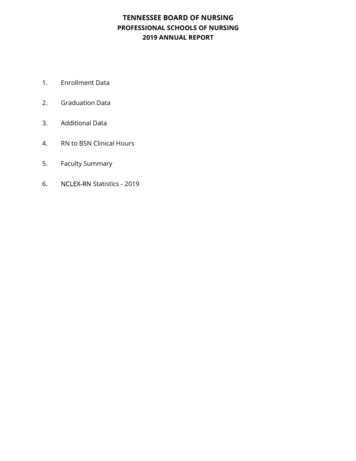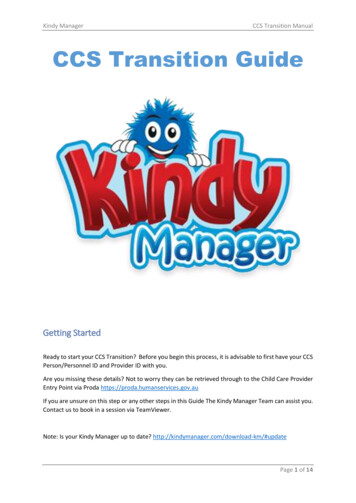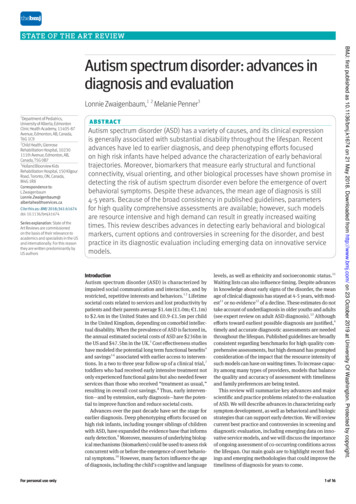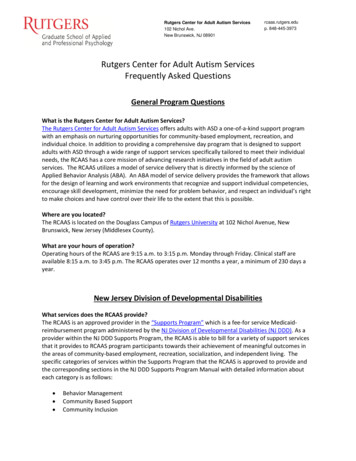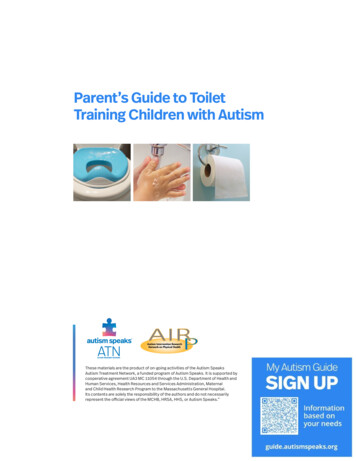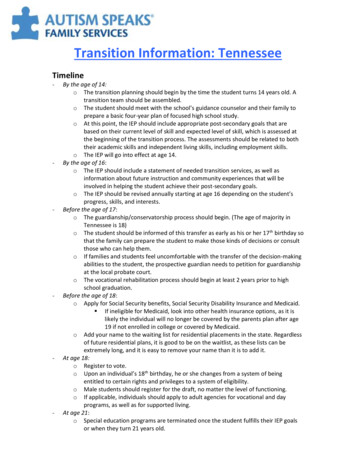
Transcription
Transition Information: TennesseeTimeline------By the age of 14:o The transition planning should begin by the time the student turns 14 years old. Atransition team should be assembled.o The student should meet with the school’s guidance counselor and their family toprepare a basic four-year plan of focused high school study.o At this point, the IEP should include appropriate post-secondary goals that arebased on their current level of skill and expected level of skill, which is assessed atthe beginning of the transition process. The assessments should be related to boththeir academic skills and independent living skills, including employment skills.o The IEP will go into effect at age 14.By the age of 16:o The IEP should include a statement of needed transition services, as well asinformation about future instruction and community experiences that will beinvolved in helping the student achieve their post-secondary goals.o The IEP should be revised annually starting at age 16 depending on the student’sprogress, skills, and interests.Before the age of 17:o The guardianship/conservatorship process should begin. (The age of majority inTennessee is 18)o The student should be informed of this transfer as early as his or her 17th birthday sothat the family can prepare the student to make those kinds of decisions or consultthose who can help them.o If families and students feel uncomfortable with the transfer of the decision-makingabilities to the student, the prospective guardian needs to petition for guardianshipat the local probate court.o The vocational rehabilitation process should begin at least 2 years prior to highschool graduation.Before the age of 18:o Apply for Social Security benefits, Social Security Disability Insurance and Medicaid. If ineligible for Medicaid, look into other health insurance options, as it islikely the individual will no longer be covered by the parents plan after age19 if not enrolled in college or covered by Medicaid.o Add your name to the waiting list for residential placements in the state. Regardlessof future residential plans, it is good to be on the waitlist, as these lists can beextremely long, and it is easy to remove your name than it is to add it.At age 18:o Register to vote.o Upon an individual’s 18th birthday, he or she changes from a system of beingentitled to certain rights and privileges to a system of eligibility.o Male students should register for the draft, no matter the level of functioning.o If applicable, individuals should apply to adult agencies for vocational and dayprograms, as well as for supported living.At age 21:o Special education programs are terminated once the student fulfills their IEP goalsor when they turn 21 years old.
Starting the Transition Process:The IEP should be started by the time the student is 14 years old at the latest. At thispoint, the IEP should include appropriate post-secondary goals that are based on theircurrent level of skill and expected level of skill, which is assessed at the beginning of thetransition process. The assessments should be related to both their academic skills andfunctional living skills, including employment and independent living skills.A transition team should be assembled to help the student and his or her familydetermine what goals would be appropriate for the student and what the best course ofaction is to achieve those goals. The IEP team should include the student’s parents orguardians, their teachers, their therapists, possibly physicians and psychologists (orthose who have a better understanding of the current level of skill of the student) and ifany external agency is currently or in the future being used, a representative from thatagency should be present at the IEP meetings. At these meetings, it is best to discusswhat the student’s wishes are, which is best done if the student is able to attend theirmeetings. If they cannot attend the meetings, then someone needs to be present at themeeting that will advocate the student’s wishes and understands the student’sstrengths and weaknesses.The annual meetings should assess the student’s progress and the student’s completionof their short-term goals. By doing this, the team can decide whether the long-term IEPgoals are still practical and alter them as necessary.Education:Since the IEP will go into effect when the student turns 14 years old, it is best to includea detailed course of study in the IEP at that time. This should include any courseworkeither for academics or other skills and at what level of their studies they will be takingthose classes. By the time the student is in 8th grade (14 years old), the student shouldmeet with the school’s guidance counselor and their family to prepare a basic four-yearplan of focused high school study. The plan should be revised when the student is in 10thgrade (16 years old) so that the course of study can be refocused as per the student’swishes and post-secondary goals. This course of study should either ease the studentthrough the transition between high school and the job market or post-secondaryeducation. The IEP should also include what diploma option the student plans to takeand a prospective graduation date. Also, it is important to include if the student isplanning on taking any version of post-secondary education, such as college. If thestudent is hoping to go to college, the IEP should include the times the student wishesto take the required standardized tests and also the times when they will complete theirapplications.The state of Tennessee provides a set of requirements that must be followed and LEAscannot change those requirements. There are a variety of diploma options available forthe student: the honors diploma, the regular high school diploma, the IEP/Specialeducation diploma or a certificate of attendance. The transition certificate will be
awarded to a student with disability at the end of their fourth years of high school andwho were unable to complete the 22-credit requirement for the standard diploma, buthave completed their IEP goals. The student can still attend school after they get thatcertificate so that they can get the standard diploma. FAPE is provided until the studentis 22 years old. This certificate will be awarded to the student who has completed theirIEP goals, completed a portfolio, and have satisfactory records of attendance andconduct. Any allowances for the student’s requirements in getting the standard diplomamust be addressed and approved within the student’s IEP. The state of Tennessee doesrequire ALL students to complete the state exit exam to get the standard high schooldiploma.Guardianship:The age of majority is 18 years old. This means that at 18, the rights of making decisionsabout the student’s welfare transfer from their parents or guardians to the student. Thismeans that the student will have the power to make their own decisions about theireducation, their health and their finances. They should be informed of this transfer asearly as their 17th birthday so that the family can prepare the student to make thosekinds of decisions or consult those who can help them. If possible, some sort ofstatement of understanding of those rights should be included in the student’s IEP.If the family feels uncomfortable transferring the rights due to the level of the student’sdisability or if the student feels that they cannot handle those kinds of decisions, thereare various forms of guardianship that the student can get that will allow others to makethose decisions for them. There are other options for guardianship, including limitedguardianship (where the court decides the terms of the guardianship), joint propertyownership, conservatorship, representative payee, special needs trusts and a durablepower of attorney that can help preserve the student’s best interests. There are alsoguardianships and conservatorships that focus on a person’s estate or the personthemselves.It is best to start the process as early as possible. First, the concerned individual shouldfile a petition at the local district court. The court will appoint a guardian ad litem, whichis an attorney that will represent the disabled individual during the hearing. Thepetition and the guardian ad litem do require high fees. Some sort of proof, such as aphysician’s letter or the physician themselves being present in court, of the student’sdisability needs to be given to the court. The judge will make the best decision based onthe level of the student’s disability. The judge will also state terms and a method oftermination for the guardianship. Also, the court gets to decide who the best person isto be the student’s guardian depending on the evidence that is presented to them. Oncea guardian is appointed, they are responsible for reporting to the court on a regularbasis so that the judge can ensure that the person is serving the disabled individual’sbest interests. If the judge feels that they are not doing their job, the judge has thepower to terminate the guardianship whenever they feel necessary.
If public guardianship or conservatorship is an option, since the student does not haveanyone else who is qualified or willing to be their guardian, then the Tennessee GeneralAssembly can appoint someone to care of the disabled individual. They will beappointed by the local court, but there are fees for this kind of guardianship.Public Guardianship: lConservatorship and Alternatives to Conservatorship: A Guide for ip Handbook.pdfVocational Rehabilitation:To be eligible for VR services, one must have a physical or mental disability that impedestheir ability to be employed, and as a result, require VR services to obtain or keepemployment. Individuals are presumed eligible if they have Social Security Insurance.The VR offices and counselor will provide a diagnosis based on the assessments ofworking skills. The VR office will help provide counseling and guidance, treatment, jobtraining and maintenance, transportation, transition services from school to work,independent living services, assistive technology and supported employment, jobplacement and post-employment services. An individual can be referred to this programor can apply individually.Social Security:Benefits should be applied for before the student’s 18th birthday and then be reevaluated after the student’s 18th birthday. It is also important that the office becontacted well in advance before the student’s 18th birthday to understand thateligibility and application process.Applicants may apply online or by contacting Social Security directly. Local SocialSecurity offices can be found using SSA's office locator or by calling 800-772-1213. Social Security Administration: www.socialsecurity.gov Social Security Benefit Application: www.socialsecurity.gov/disabilityonline Social Security Benefits for People with Disabilities: www.ssa.gov/disability Social Security Office Locator: https://secure.ssa.gov/ICON/main.jspHousing Resources:Tennessee Public Housing Agency Contact tates/tn.cfmUS Department of Housing and Urban Development: HUD in HUD/states/tennessee
Tennessee ResourcesTennessee Office of Special EducationDepartment of Education(888) 212-3162(615) cationSpecial Education Secondary Transition: secondary-transitionTennessee Vocational Rehabilitation ServicesDepartment of Human Services(615) rehabilitationDepartment of Intellectual and Developmental Disabilities(615) 253-2236www.tn.gov/diddThe Secondary Transition ProjectArc of TennesseeFunded by State of Tennessee, Department of Education(615) 248-5878www.thearctn.org/Education.phpSecondary Transition Handbook: andbook.pdf
Vocational Rehabilitation: To be eligible for VR services, one must have a physical or mental disability that impedes their ability to be employed, and as a result, require VR services to obtain or keep employment. Individuals are presumed eligible if they have Social Security Insurance.

